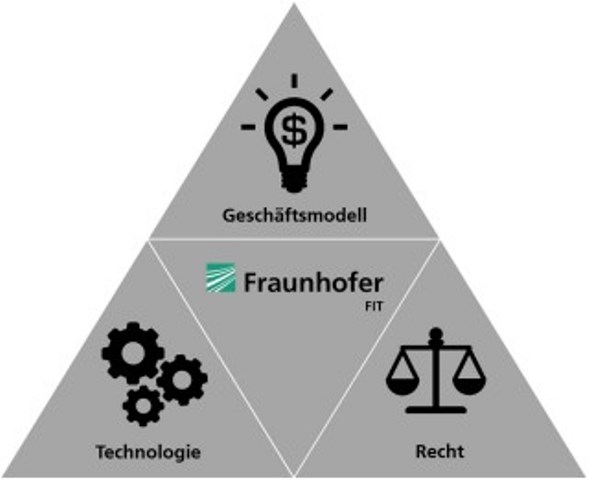Blockchains - Fraunhofer Lab develops first prototypes
Since 2016, the Fraunhofer Institute for Applied Information Technology FIT has been exploring blockchains in depth in its newly founded Blockchain Lab. The customers come from all areas of the economy. They want to know: What's the hype about the new technology? And what does it mean for my business field? The Fraunhofer experts clarify, identify use cases and develop prototypes.

"When people hear blockchains, many only think of payment transactions and bitcoins. But the technology's potential lies primarily in the area of process traceability," says Prof. Dr. Gilbert Fridgen from Fraunhofer FIT, who familiarizes representatives from business and industry with blockchain in workshops.
Decentralized database
A blockchain is a kind of decentralized database. Each blockchain participant stores the entire database on their computer. If new data is added, the blockchain is updated everywhere. "Because every participant has an up-to-date copy of the database, it can hardly be manipulated," explains Prof. Wolfgang Prinz, Deputy Director of Fraunhofer FIT. What makes the database even more secure is that each data block is cryptographically linked to the next. If someone were to try to change the contents of the blockchain, this would immediately be detected by all other participants.
In a blockchain, every step of a process can be securely and irreversibly recorded with all the associated data - ideal for internal company documentation, for example. "Audits could be carried out much more quickly, easily and cost-effectively if all audit-relevant documents were written to a blockchain," says Fridgen. Because it would show beyond doubt who did what, when and how.
"This is actually where all of our workshop attendees took notice. Especially in highly regulated industries, the cost of audits often runs into the millions."
Simplification of trade in goods
Numerous business processes can also be implemented well with blockchain solutions. For example, the experts at the Blockchain Lab have developed a prototype for handling global trade in goods. This allows every step of the transaction to be documented securely, transparently and traceably - from the placing of the order to the delivery of the goods. Until now, banks, as trust-building authorities across national borders, have guaranteed that trading partners are solvent and fulfill their contractual obligations.
"In the future, our blockchain solution could take over this role." In general, Blockchain is particularly interesting for companies whose business models are based on positions of trust, he says. "Blockchain cannot yet replace banks, notaries or auditors. But the technology offers a lot of potential in this area in particular," says Prinz.
Blockchain is also a challenge for providers of online trading platforms. This is because the new technology would allow secure transactions between buyers and sellers to be processed directly - without additional protection from the platform operator. "Blockchain technology could be used to establish a new generation of the Internet. The Internet of Things, which we are currently talking about, will be joined by an Internet of Trust," Prinz believes.
Secure proof of origin
Blockchain is also attractive for the logistics industry: A transport chain could be documented seamlessly and thus guarantee the authenticity of the shipped object. "There is already a blockchain solution for diamond transports," says Prinz. Blockchain could also be used to securely prove the origin of medicines or foodstuffs and to check whether, for example, refrigeration was guaranteed throughout the entire transport.









